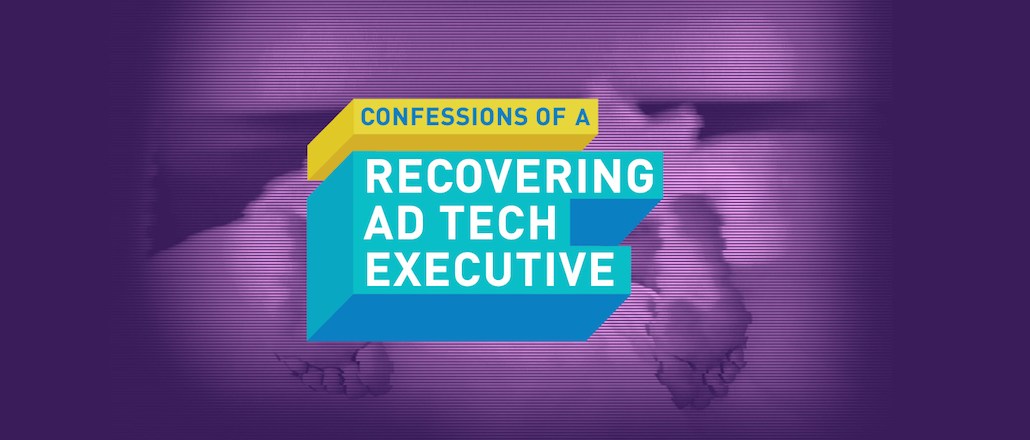Save 50% on a 3-month Digiday+ membership. Ends Dec 5.
‘Fake it till you make it’: Confessions of a recovering ad tech executive

This article is part of our Confessions series, in which we trade anonymity for candor to get an unvarnished look at the people, processes and problems inside the industry. More from the series →
Programmatic advertising is premised on a belief in big data, but for the latest in our anonymous Confessions series, we talked to a former ad tech executive who says that in the quest to differentiate on their services, a lot of vendors play fast and loose with the truth. Here are excerpts of our conversation:
How did digital advertising get so broken?
When a big CPG company says, “I can’t raise prices with the consumer but need to be more profitable, so I need to cut agency fees so you have fewer people.” Everything has to go through a small number of experts who can’t handle the load. It starts with brands saying digital needs to be an experiment. I started on the agency side and got to experience what it’s like when your client keeps reducing your fees even as their asks increase. You hire recent college grads who are cheap, you let them augment their income by letting vendors take them out for dinners and you make up your margin on vendor-provided beer. Hence you get the trading desk, you get jeans parties.
What were you expecting when you got into ad tech?
All of a sudden we were talking about big data. I was allured by the idea that data can solve things. That in a very murky world of media that data could be the clarifying lens.
What was the awakening?
Shenanigans is at the heart of it. There is such a “fake-it-till-you-make-it” approach of ad tech startups. Almost all of them feel like, we’ll fake it until we have enough scale or data or algorithms get smarter.
What does that mean in practice?
What we say we do doesn’t match up with what we do. It’s really hard to differentiate, but that might be because it doesn’t make a difference. There’s this magical belief that there’s this algorithm that can solve the relevance problem. So you have people saying we’ll retarget a little bit better. You find yourself being asked to do many completely dishonest things. We have to show we’re better than the industry standard — click-through rate, cost per lead, cost per acquisition. All it is a statement and a deck. It’s all self-reported.
Do the agencies accept it?
They make decisions based on the Oakleys.
What did you learn about gifting when you went to the ad tech side?
When I was on the agency side, every Friday we invited one of our partners to sponsor our beer Friday. For the cost of several cases of beer and food, their salespeople could interact with us. When I was on the selling side, I found myself exposed to every agency and the boldness with which people would ask for stuff.
Ad position: web_incontent_pos1
So you saw how extreme it can get.
There’s a difference between asking and demanding a gift. We offered to take people to a concert, and as it got closer they asked for a limo to take them there, and they expressed surprise that we were going with them. There’s a guy who’s highly placed in the business. We gave a Christmas gift that was unusual. I only gave out 100 of them, and he wasn’t a client but he called up and ask for it. I’ve never looked at him the same way again.
Did you feel like the grownup in the room?
Yes, particularly working for a CEO that was almost half my age. Try to talk to someone half your age about music.
You’re pretty disenchanted with the current state of ad tech. Where would you advise brands to put their money today?
In this undifferentiated business, what most people are selling is a different-colored button, which delivers impressions. But the output is more ignorable impressions. I will get a heart attack saying this, but I would put all my money into Facebook and Google. They actually have the rich and specific data that everybody else lacks.
Isn’t that bad for publishers if Facebook continues to hold so much sway?
If publishers went away from Facebook, we would be left with each other’s status updates, which would become very boring, very quickly. A publisher cull that brings back more quality professional content is good for everybody, culturally, socially, for advertisers. Too many ad impressions means every one is worth less. The democratization of media is not a good thing.
More in Media

What publishers are wishing for this holiday season: End AI scraping and determine AI-powered audience value
Publishers want a fair, structured, regulated AI environment and they also want to define what the next decade of audience metrics looks like.

Digiday+ Research Subscription Index 2025: Subscription strategies from Bloomberg, The New York Times, Vox and others
Digiday’s third annual Subscription Index examines and measures publishers’ subscription strategies to identify common approaches and key tactics among Bloomberg, The New York Times, Vox and others.

From lawsuits to lobbying: How publishers are fighting AI
We may be closing out 2025, but publishers aren’t retreating from the battle of AI search — some are escalating it, and they expect the fight to stretch deep into 2026.
Ad position: web_bfu


